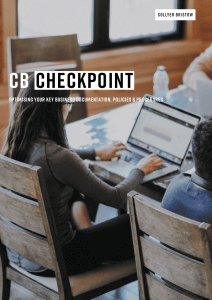
The Team
Our lawyers have the expertise and experience to provide you with creative, personalised solutions in a clear and understandable way.
Our Publications
Discover a wealth of invaluable guidance in the form of guides and brochures written by our expert lawyers.
Your IP Rights Health Check
Are you certain your business’ IP rights are protected?
About
What are performers’ rights?
The right relates to live performances. Anyone who acts, sings, performs, reads aloud, plays in, or otherwise performs a literary, dramatic or musical work is entitled to performers’ rights. The definition is broad enough that everyone from voice-over artists to street buskers may seek protection for their performances. Unlike with copyright, the work does not have to be original to be protected. For example, an actor can claim performers’ rights even if her performance is similar or even identical to other, earlier performances.
Under UK law, there are two types of rights for performers:
- A right against recordings and broadcasts of live performances made without the performer’s permission, which includes streaming or uploading the recording to the internet.
- A right to payment for authorised versions of their work; for example, when recordings of a performance are played in public, the performer should receive a payment.
Separately, performers also have a moral right in their performances. This includes the right to be identified as a performer and the right to object to derogatory treatment, such as when alterations are made to their work which damage the performer’s reputation.
Performers can also assert property rights in copies of their performance. The performer’s consent is required to copy a recording of a qualifying performance, or issue, rent, lend or make available to the public copies of such a recording
What happens if a performer’s rights are infringed?
As long as a performance meets the legal definition, it will be protected. There are no additional conditions to satisfy, and rights last for 50 years from the public performance, or, if during this period a recording is released, 70 years from the end of the calendar year in which the recording was released.
If rights are infringed, the usual intellectual property remedies apply. These include damages for monetary loss or an injunction to stop unauthorised distribution. Criminal sanctions may also be available.
How we can help you
Performers’ rights are complex and may overlap with copyright or contractual protection. Working closely with our media team, our expert lawyers can:
- Advise you on how best to protect your performers’ rights
- Advise you on contracts and commercial agreements that involve performers’ rights
- Help to enforce your performers’ rights if they are infringed, whether through legal action or alternative dispute resolution
We help performers’ rights owners, but can also help you if you’re involved in a dispute over performers’ rights or have been accused of infringing another performers’ rights. We are focussed on providing swift and effective solutions that have our clients’ best interests at heart.
Patrick WheelerPartner - Head of IP & Data Protection
+44 20 7470 4432+44 7786 962089patrick.wheeler@collyerbristow.com
Spotlight
E-Commerce Agreements
As the opportunities for digital businesses grow, so does the legislation. E-commerce regulations, distance selling regulations, consumer protection from unfair trading, electronic marketing regulations, GDPR and their international equivalents – all these regulations need to be complied with before you can sell online.
We specialise in helping businesses navigate the complex area of e-commerce law, including the additional complexities associated with operating your businesses in foreign countries over the web. Our advice includes:
- Website and mobile app development agreements
- Hosting agreements
- IT services contracts
- Software licence agreements
- Terms and conditions of sale to consumers, including cooling-off periods and cancellation
- Website terms of use
- Protecting intellectual property on the site (images, content, artwork)
- Privacy and cookies policies
- Data processing agreements and agreements governing international transfers of personal data
- Contracting with overseas customers, clients and suppliers
- Compliance with industry-specific regulatory requirements, such as secondary ticketing for events
- Agreements for platforms acting as an online intermediary service
- Harmonisation between your terms of business and other commercial contracts, such as distribution agreements.
Our commercial solicitors have experience drafting all types of e-commerce agreements, with a thorough understanding of laws relating to online trading. Whatever your commercial objectives, we are confident we have a solution that achieves the dual goals of preserving the customer experience while ensuring your company is well protected from risk.
Quick glance: publications
Performers’ Rights Publications
CB Checkpoint: overview
There are a number of key policies, procedures and documents your business should keep up to date, to be both legally protected and in preparation for investment or exit. Our team will give your business a full check-over.
Performers’ Rights insights
Shorter Reads
A Wake-Up Call for Platform ProvidersA Wake-Up Call for Platform Providers
Read more
Shorter Reads
Getty Images’ claims against Stability AI are dismissed by UK High CourtGetty Images’ claims against Stability AI are dismissed by UK High Court
Read more
Shorter Reads
Digital Driving Licence to be introduced by the GovernmentDigital Driving Licence to be introduced by the Government
Read more
News
Collyer Bristow enhances Commercial and IP offering with strategic senior hire, Sarah CoeCollyer Bristow enhances Commercial and IP offering with strategic senior hire, Sarah Coe
Read more
Shorter Reads
ICO response to the Data (Use & Access) Bill (DUAB)ICO response to the Data (Use & Access) Bill (DUAB)
Read more
Longer Reads
Data (Use & Access) Bill introduced to Parliament – what does this mean for businesses?Data (Use & Access) Bill introduced to Parliament – what does this mean for businesses?
Read more
News
Tribute to our Partner, Tim BamfordTribute to our Partner, Tim Bamford
Read more
Longer Reads
Regulators respond to government’s ‘pro-innovation approach to AI regulation’Regulators respond to government’s ‘pro-innovation approach to AI regulation’
Read more
Longer Reads
Does UK Copyright law provide adequate protection to creators of Generative AI artworks?Does UK Copyright law provide adequate protection to creators of Generative AI artworks?
Read more
Longer Reads
Manufacturing, printing technology and intellectual property rightsManufacturing, printing technology and intellectual property rights
Read more
Longer Reads
Copyright claims up in flames: Evans v John Lewis PLC and AnotherCopyright claims up in flames: Evans v John Lewis PLC and Another
Read more
Podcasts
The Ed Sheeran/Marvin Gaye copyright disputeThe Ed Sheeran/Marvin Gaye copyright dispute
Listen now
You might also like
Need some more information? Make an enquiry below
Performers’ Rights key contacts
- Patrick
WheelerPartner - Head of IP & Data Protection
Talk to Patrick about Intellectual property disputes, Data protection, Digital, Intellectual property and Manufacturing
Performers’ Rights
Advising you on how best to protect your performers’ rights
Alongside copyright, performers have several rights in relation to their performances, known collectively as ‘performers’ rights.’ The rights make it possible for performers to control and be compensated for the commercial exploitation of their performances and take action against bootlegging.
The Team
Our lawyers have the expertise and experience to provide you with creative, personalised solutions in a clear and understandable way.
Our Publications
Discover a wealth of invaluable guidance in the form of guides and brochures written by our expert lawyers.
Your IP Rights Health Check
Are you certain your business’ IP rights are protected?
What are performers’ rights?
The right relates to live performances. Anyone who acts, sings, performs, reads aloud, plays in, or otherwise performs a literary, dramatic or musical work is entitled to performers’ rights. The definition is broad enough that everyone from voice-over artists to street buskers may seek protection for their performances. Unlike with copyright, the work does not have to be original to be protected. For example, an actor can claim performers’ rights even if her performance is similar or even identical to other, earlier performances.
Under UK law, there are two types of rights for performers:
- A right against recordings and broadcasts of live performances made without the performer’s permission, which includes streaming or uploading the recording to the internet.
- A right to payment for authorised versions of their work; for example, when recordings of a performance are played in public, the performer should receive a payment.
Separately, performers also have a moral right in their performances. This includes the right to be identified as a performer and the right to object to derogatory treatment, such as when alterations are made to their work which damage the performer’s reputation.
Performers can also assert property rights in copies of their performance. The performer’s consent is required to copy a recording of a qualifying performance, or issue, rent, lend or make available to the public copies of such a recording
What happens if a performer’s rights are infringed?
As long as a performance meets the legal definition, it will be protected. There are no additional conditions to satisfy, and rights last for 50 years from the public performance, or, if during this period a recording is released, 70 years from the end of the calendar year in which the recording was released.
If rights are infringed, the usual intellectual property remedies apply. These include damages for monetary loss or an injunction to stop unauthorised distribution. Criminal sanctions may also be available.
How we can help you
Performers’ rights are complex and may overlap with copyright or contractual protection. Working closely with our media team, our expert lawyers can:
- Advise you on how best to protect your performers’ rights
- Advise you on contracts and commercial agreements that involve performers’ rights
- Help to enforce your performers’ rights if they are infringed, whether through legal action or alternative dispute resolution
We help performers’ rights owners, but can also help you if you’re involved in a dispute over performers’ rights or have been accused of infringing another performers’ rights. We are focussed on providing swift and effective solutions that have our clients’ best interests at heart.
Patrick WheelerPartner - Head of IP & Data Protection
View Patrick Wheeler's profileCécile de LagardeSenior Associate
View Cécile de Lagarde's profileCharles BraithwaitePartner
View Charles Braithwaite's profileNikhil VyasAssociate
View Nikhil Vyas's profileSarah CoePartner
View Sarah Coe's profileSPOTLIGHT
E-Commerce Agreementsopen
As the opportunities for digital businesses grow, so does the legislation. E-commerce regulations, distance selling regulations, consumer protection from unfair trading, electronic marketing regulations, GDPR and their international equivalents – all these regulations need to be complied with before you can sell online.
We specialise in helping businesses navigate the complex area of e-commerce law, including the additional complexities associated with operating your businesses in foreign countries over the web. Our advice includes:
- Website and mobile app development agreements
- Hosting agreements
- IT services contracts
- Software licence agreements
- Terms and conditions of sale to consumers, including cooling-off periods and cancellation
- Website terms of use
- Protecting intellectual property on the site (images, content, artwork)
- Privacy and cookies policies
- Data processing agreements and agreements governing international transfers of personal data
- Contracting with overseas customers, clients and suppliers
- Compliance with industry-specific regulatory requirements, such as secondary ticketing for events
- Agreements for platforms acting as an online intermediary service
- Harmonisation between your terms of business and other commercial contracts, such as distribution agreements.
Our commercial solicitors have experience drafting all types of e-commerce agreements, with a thorough understanding of laws relating to online trading. Whatever your commercial objectives, we are confident we have a solution that achieves the dual goals of preserving the customer experience while ensuring your company is well protected from risk.
Performers’ Rights Publications
Performers’ Rights insights
Shorter Reads
A Wake-Up Call for Platform ProvidersA Wake-Up Call for Platform Providers
Read more
Shorter Reads
Getty Images’ claims against Stability AI are dismissed by UK High CourtGetty Images’ claims against Stability AI are dismissed by UK High Court
Read more
Shorter Reads
Digital Driving Licence to be introduced by the GovernmentDigital Driving Licence to be introduced by the Government
Read more
News
Collyer Bristow enhances Commercial and IP offering with strategic senior hire, Sarah CoeCollyer Bristow enhances Commercial and IP offering with strategic senior hire, Sarah Coe
Read more
Shorter Reads
ICO response to the Data (Use & Access) Bill (DUAB)ICO response to the Data (Use & Access) Bill (DUAB)
Read more
Longer Reads
Data (Use & Access) Bill introduced to Parliament – what does this mean for businesses?Data (Use & Access) Bill introduced to Parliament – what does this mean for businesses?
Read more
News
Tribute to our Partner, Tim BamfordTribute to our Partner, Tim Bamford
Read more
Longer Reads
Regulators respond to government’s ‘pro-innovation approach to AI regulation’Regulators respond to government’s ‘pro-innovation approach to AI regulation’
Read more
Longer Reads
Does UK Copyright law provide adequate protection to creators of Generative AI artworks?Does UK Copyright law provide adequate protection to creators of Generative AI artworks?
Read more
Longer Reads
Manufacturing, printing technology and intellectual property rightsManufacturing, printing technology and intellectual property rights
Read more
Longer Reads
Copyright claims up in flames: Evans v John Lewis PLC and AnotherCopyright claims up in flames: Evans v John Lewis PLC and Another
Read more
Podcasts
The Ed Sheeran/Marvin Gaye copyright disputeThe Ed Sheeran/Marvin Gaye copyright dispute
Listen now
Need some more information? Make an enquiry below.
Message us on WhatsApp (calling not available)
Please note that Collyer Bristow provides this service during office hours for general information and enquiries only and that no legal or other professional advice will be provided over the WhatsApp platform. Please also note that if you choose to use this platform your personal data is likely to be processed outside the UK and EEA, including in the US. Appropriate legal or other professional opinion should be taken before taking or omitting to take any action in respect of any specific problem. Collyer Bristow LLP accepts no liability for any loss or damage which may arise from reliance on information provided. All information will be deleted immediately upon completion of a conversation.
Close

























